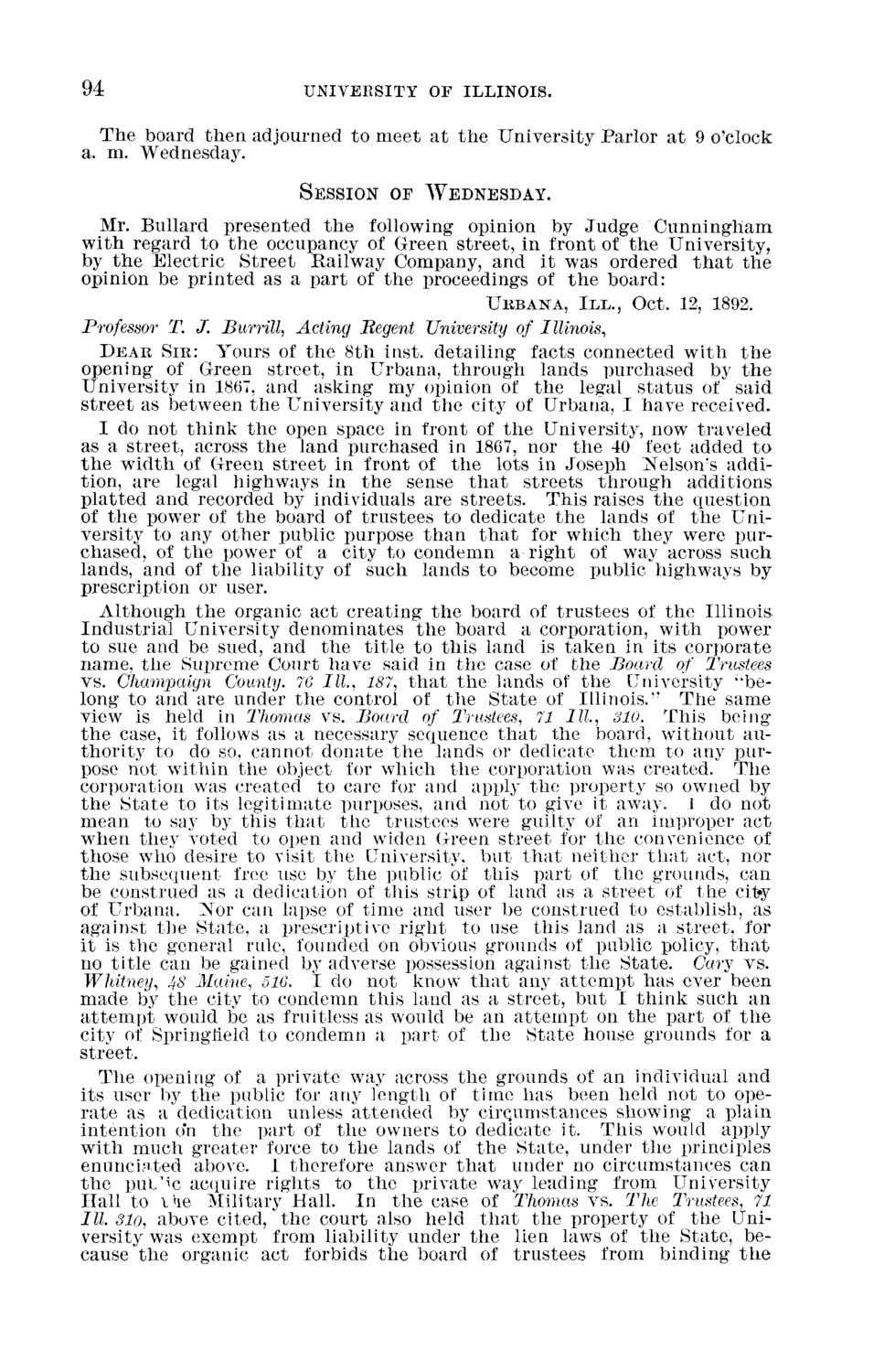| |
| |
Caption: Board of Trustees Minutes - 1894
This is a reduced-resolution page image for fast online browsing.

EXTRACTED TEXT FROM PAGE:
94 UNIVERSITY OF ILLINOIS. The board then adjourned to meet at t h e University Parlor at 9 o'clock a. m. Wednesday. SESSION OF W E D N E S D A Y . Mr. Bullard presented the following opinion by Judge Cunningham with regard to the occupancy of Green street, in front of the University, by t h e Electric Street Kailway Company, and it was ordered t h a t the opinion be printed as a part of the proceedings of t h e board: URBANA, I I I . , Oct. 12, 1892. Professor T. J. Bur rill, Acting Begent University of Illinois, D E A R SIR: Yours of the 8th inst. detailing facts connected with t h e opening of Green street, in Urbana, through lands purchased by t h e University in 1867, and asking my opinion of the legal status of said street as between the University and t h e city of Urbana, I have received. I do not think the open space in front of the University, now traveled as a street, across the land purchased in 1867, nor the 40 feet added t o t h e width of Green street in front of t h e lots in Joseph Nelson's addition, are legal highways in t h e sense t h a t streets through additions platted and recorded by individuals are streets. This raises t h e question of the power of the board of trustees to dedicate the lands of the University to any other public purpose than t h a t for which they were purchased, of the power of a city to condemn a right of way across such, lands, and of the liability of such lands to become public highways by prescription or user. Although the organic act creating t h e board of trustees of the Illinois Industrial University denominates the board a corporation, with power to sue and be sued, and the title to this land is taken in its corporate name, t h e Supreme Court have said in the case of the Board of Trustees vs. Champaign County. 76 III., 187, t h a t the lands of the University "belong to and are under the control of the State of Illinois." The" same view is held in Thomas vs. Board of Trustees, 71 III., 310. This being the case, it follows as a necessary sequence t h a t the board, without authority to do so, cannot donate t h e lands or dedicate them to any purpose not within the object for which the corporation was created. The corporation was created to care for and apply the property so owned by the State to its legitimate purposes, and not to give it away. 1 do not mean to say by this t h a t t h e trustees were guilty of an improper act when they voted to open and widen Green street for the convenience of those who desire to visit t h e University, but t h a t neither t h a t act, nor the subsequent free use by the public of this part of the grounds, can be construed as a dedication of this strip of land as a street of the cifry of Urbana. iSTor can lapse of time and user be construed to establish, as against the State, a prescriptive right to use this land as a street, for it is the general rule, founded on obvious grounds of public policy, t h a t no title can be gained by adverse possession against the State. Gary vs. Whitney, 48 Maine, 516. I do not know t h a t any attempt has ever been made by the city to condemn this land as a street, but I think such an attempt would be as fruitless as would be an attempt on the part of t h e city of Springfield to condemn a part of t h e State house grounds for a street. The opening of a private way across the grounds of an individual and its user by the public for any length of time has been held not to operate as a dedication unless attended by circumstances showing a plain intention o*n the part of the owners to dedicate it. This would apply with much greater force to the lands of the State, under the principles enunciated above. I therefore answer t h a t under no circumstances can the puL^c acquire rights to the private way leading from University Hall to \he Military Hall. In t h e case of Thomas vs. The Trustees, 71 III. 81o, above cited, the court also held t h a t the property of the University was exempt from liability under the lien laws of the State, because the organic act forbids t h e board of trustees from binding t h e
| |